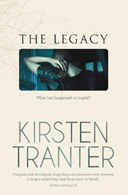 | Kirsten Tranter's first novel, The Legacy, is the first of two she is contracted to write for HarperCollins. As the book is released she was interviewed by Miriam Cosic for "The Australian". |
She first toyed with the idea of her novel while escaping the reality of Darwin, in the Northern Territory, a location she didn't find conducive to working on her thesis. Her husband had taken a job here in indigenous media. "I was a bit isolated," she says, clearly understating her point. "There was no one to talk to about my work, no one within a 5000-mile radius."
She filled in time by toying with the idea for a book - how easy it would have been to disappear, or to be disappeared, during the attack on the World Trade Centre in 2001 - and wrote a few tentative chapters. It began to overlap with another idea: an alternative take on Henry James's most famous novel. "I always wanted to rewrite that story because I can't stand the way it ends," she says. "I felt indignant about it, maybe more than most ... There was something about the way [Isabel Archer] just disappears into a depressing, mysterious future. And for a lot of people who lost people in 9/11, it was very hard to accept that they had died. People were always described as missing, that was in the notices all over the city." Tranter was living on the Lower East Side when it happened. After Darwin, Tranter put the novel on the backburner. She came back to Australia in 2006 after her son, Henry, was born. Teaching a writing course at a university, she felt inspired to return to fiction. "I started thinking of myself as a creative writer again, and someone said, 'You should apply for an Australia Council grant; it will only take you a day to do it.' "
She had nearly finished her thesis. Her fellowship had run out. She was also teaching Shakespeare at another university, working as a part-time research assistant there and doing part-time work for her mother's company, Australian Literary Management. A grant sounded handy: she applied to the Australia Council and succeeded. "I didn't clear the decks and sit down to write until I finished my dissertation," she says. "Then I wrote it really quickly. I was ready to write it."
